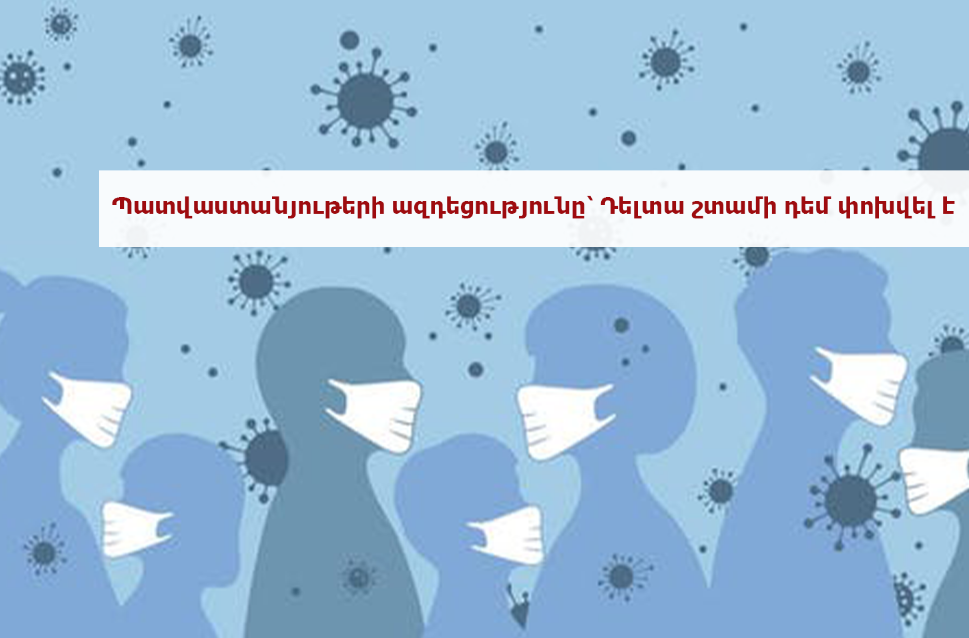
The new strain of coronavirus, the Delta strain, drastically changed the course of the epidemic, leading to an increase in the number of infected people. In its latest weekly report on the epidemic, the World Health Organization (WHO) released worrying figures: the number of infections has reached 4.4 million in the last two months, bringing the total number of infections worldwide to 206 million. The death toll is almost the same as last week – 66,000 deaths.
Recently, Romella Abovyan, Head of the Department of Epidemiology of Infectious and Noncommunicable Diseases, also spoke about the epidemic situation.
In response to a reporter’s question about the Delta strain, she said that all vaccines are effective against all strains because they are designed to fight the coronavirus, regardless of the strain. Romella Abovyan did not detail that, unlike the previous strains, in the case of Delta the effectiveness of the vaccine has decreased. She also did not touch upon the differences in the effectiveness of vaccines.
Media.am studied the latest research in the scientific world on the Delta strain, and this article will present how effective the vaccines are against the latest Delta strain.
The effectiveness of vaccines on the Delta strain has declined
An April study found that vaccinated people were less likely to become a reason for the spread of infection, which meant that contact with them and especially between them could not be dangerous. However, with the arrival of Delta, the situation has changed. The new strain was distinguished not only by a greater spread of the illness but also by a decrease in the effectiveness of the vaccine. This is evidenced by various studies:
? The British study REACT-1 showed that the effectiveness of vaccination against the Delta strain is 59%. The study was hampered by the fact that the researchers did not have information about the specific type of vaccine, although it is known that most of the British received AstraZeneca and Pfizer. The results obtained were averaged for these two vaccines.
? A similar result was shown by an American study conducted at the Mayo Clinic. It was developed separately for Pfizer and Moderna vaccines. In the case of Moderna, the efficiency was 76%, in the case of Pfizer – 42%.
Despite the differences in vaccines, it can now be said that their effectiveness against the virus is between 40-60%, which is not enough to form collective immunity. Moreover, the delta strain of the virus spreads almost equally among vaccinated and unvaccinated people. This is why wearing masks is mandatory for vaccinated people as well. This is evidenced, for example, by a recent study in Wisconsin, or another earlier study in Singapore. The latter also showed that vaccinated people respond faster to the infection and recover faster.
Studies by Scottish scientists show that the effectiveness of Pfizer in people with symptoms has dropped from 92% (in the case of alpha strain) to 79%, and for AstraZeneca from 73% to 60%.
In the US state of Colorado, where there was an outbreak of the Delta strain, the effectiveness of the vaccine was 79%, while in neighboring states where the Delta strain had not yet reached, the effectiveness was 89%. In this case, we are talking about Pfizer, Moderna and J&J vaccines.
As for the Sputnik V, the head of the Russian “Gamalea” National Research Center Alexander Ginsburg recently said that a new, modified version of the Sputnik V has been developed specifically for the Delta strain. Ginzburg also warned that it was too early to talk about its effectiveness.
The good news
The good news is that all the vaccines approved by the WHO for emergency use really protect against the possible serious consequences of the Delta strain, such as hospitalization and death. In terms of preventing severe side effects, all vaccines are almost 90% effective. The more complicated the patient’s condition, the better the vaccine protects.
The WHO announced in early July that Pfizer-BioNTech and AstraZeneca were also working against the Delta strain of the coronavirus, stressing that the vaccines were less effective in treating the mild disease.
? According to the British Public Health Agency (PHE), the effectiveness of the vaccine for symptomatic patients has dropped from 89% to 79%. Meanwhile, in the case of those hospitalized, the efficiency remained almost the same – 93% instead of 96%.
? According to a study conducted in Qatar, the effectiveness of Pfizer in hospitalized patients was 97.3%, and in Moderna – 100% (there was no severe course of the disease).
? A study published in May by the British Ministry of Health showed that one dose of Pfizer reduces the risk of death and severe course of the virus by almost as much as two doses of AstraZeneca. The second dose of AstraZeneca increases protection against the Delta strain by up to 60%, while the two doses of the Pfizer vaccine are 88% effective. This is one of the reasons why we get the vaccine in two doses.
? In another study, the British found that people who received a single dose of the vaccine were hospitalized 75% less often than unvaccinated people.
Re-vaccination is a recommended solution
Although vaccines are the best way to protect against the coronavirus and its severe course, preliminary research by Oxford University researchers has shown that they are less effective in the case of the Delta strain and lose their effectiveness a few months after vaccination. The team compared the efficacy of AstraZeneca, Pfizer and Moderna vaccines against alpha and delta strains using test results from more than 750,000 people. As a result, it turned out that although the vaccines provide strong protection against COVID-19, they are less effective in the case of Delta.
Scientists see the solution as re-vaccination (double vaccination).
Although the effect of vaccines on Delta strains is lower than expected, scientists say that complete vaccination (in two doses) remains the best way to protect against Delta strains. Pfizer and BioNTech have already announced that they are currently working on a third dose of the vaccine, the main problem of which is the Delta strain. By the way, in Israel, the third dose of the vaccine has already been given to residents over 40 and employees of educational institutions. More than 1 million out of 9 million 300 thousand inhabitants have already received the third dose.
Research in recent months has shown that vaccines do not affect coronavirus strains in the same way. In the case of Delta, scientific reasoning concluded that the vaccine had lost some of its effectiveness. The impact is estimated at 40-60%. On the other hand, vaccines continue to be highly effective against severe cases of the disease.
Ophelia Simonyan


Add new comment
Comments by Media.am readers become public after moderation. We urge our readers not to leave anonymous comments. It’s always nice to know with whom one is speaking.
We do not publish comments that contain profanities, non-normative lexicon, personal attacks or threats. We do not publish comments that spread hate.